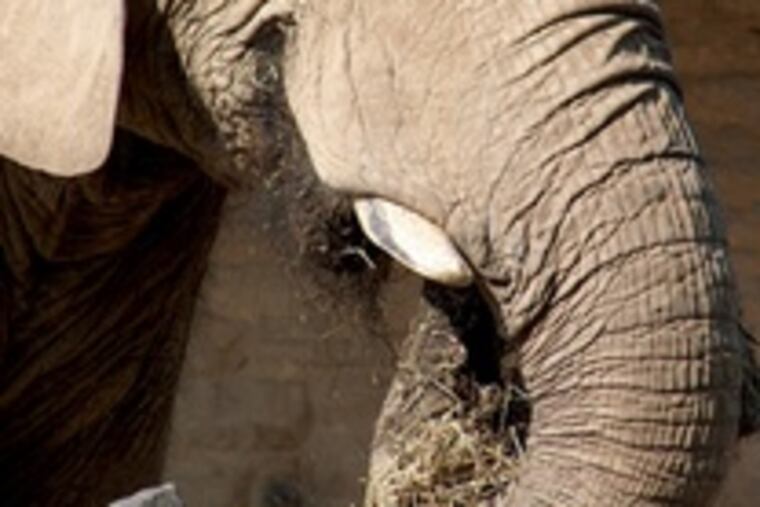Phila. Zoo's oldest elephant dies of unknown cause
The Philadelphia Zoo's Petal - at 52, the oldest African elephant in a U.S. zoo - died yesterday morning. The animal staff was unable to determine the cause of her death. It did not appear to be heat-related, and an initial exam revealed no health problems, said Andrew Baker, vice president for animal programs.

The Philadelphia Zoo's Petal - at 52, the oldest African elephant in a U.S. zoo - died yesterday morning.
The animal staff was unable to determine the cause of her death. It did not appear to be heat-related, and an initial exam revealed no health problems, said Andrew Baker, vice president for animal programs.
Tests are being conducted and results are expected over the next few weeks. In the wild, African elephants typically live to their early or mid-40s, Baker said.
Baker said the elephant-care staff found Petal lying on her right side in her stall when they arrived shortly before 7 a.m.
They were instantly alarmed because she typically sleeps standing up. The zoo's animal-care staff tried for nearly two hours to comfort her and to help her to her feet.
Veterinarians were able to get a blood sample and analyze it, but it showed no indication of dehydration or major organ failure and gave them no other clues, Baker said.
Her body temperature was normal - about 99.7 degrees - but she stopped breathing and died about 9:15 a.m.
Petal's stall had a video monitor, and Baker said it appeared that Petal's right rear leg had buckled suddenly earlier in the morning and that she had collapsed.
Beyond that, "we don't have any viable theories," Baker said. She had been healthy until her collapse, he said.
As veterinarians worked on a necropsy, "the general comment is that, especially for her age, she looks great. Which is nice to hear, but doesn't tell us much about what happened," Baker said.
Petal came to the zoo a year or two after her birth in what is now Tanzania. She lived with two other African elephants, Kallie, 25, and Bette, 24.
Because elephants are social creatures, the staff allowed Petal's two companions to be with her for about a half-hour after she died.
Baker said that Kallie and Bette explored Petal's body with their trunks, but "they seemed calm and fairly relaxed."
The rest of the day, "they seemed fine," Baker said, but he added that the staff would be watching them closely for changes in behavior or appetite.
"With elephants, given their level of intelligence and the complexity of their relationships, we need to be more aware of impacts than with other social species," he said.
Deborah Olson, the studbook keeper for North America's 218 captive elephants, praised the action.
She said that in the wild, elephants often carry the bones of deceased herd members for long distances and take particular interest in smelling them.
"One can only assume why that is," said Olson, who also is director of conservation at the Indianapolis Zoo and executive director of the International Elephant Foundation. "Elephants are still a mystery to us."
Baker said Petal's two keepers were too upset to talk publicly about her death.
In addition to the necropsy, Baker said the veterinary staff would try to comply with specimen requests researchers have on file with the Association of Zoos and Aquariums.
He said it was important for both the zoo and those in the conservation and scientific communities "to learn everything we can" that could benefit elephants both in captivity and in the wild.
Olson said researchers likely would look at such things as bone growth, reproductive issues and organ function.
"Every time an animal dies, we want to make sure we take every opportunity . . . to understand that animal better," she said.
Before Petal died, the zoo had been planning to send her, Kallie and Bette to a Western Pennsylvania facility, the International Conservation Center in Somerset County, which is under construction and could be finished by late summer.
Unable to raise the millions of dollars needed for an improved elephant facility, the zoo decided in the fall of 2006 to find new homes for the animals and later picked the Western Pennsylvania center. Dulary, an Asian elephant, was sent to a sanctuary in Tennessee a year ago.
Marianne Bessey, a lawyer who lives in Delaware County and spokeswoman for a local activist group, Friends of Philly Zoo Elephants, said yesterday that she was heartbroken over the death of Petal. She had spent a portion of Sunday at the zoo, videotaping the elephant.
Bessey said the zoo should have moved her long ago to a California sanctuary run by the Performing Animal Welfare Society.
"What's saddest of all about this is the zoo did the right thing for Dulary," she said. "It's so sad they didn't give Petal the same chance."
The group does not believe zoos can serve the best interests of elephants. Bessey felt that Petal should have been monitored 24 hours. "What's the point of having a video monitor if they're not looking at it until they arrive the next day?" she said.
In a prepared statement, Vikram H. Dewan, the zoo's chief executive officer, called Petal "a great ambassador for the endangered and threatened wild elephants of Africa and Asia."
He said that Petal "will be warmly remembered by staff and generations of zoo visitors as one of our most beloved animals. This is a great loss to the Philadelphia Zoo family and the greater Philadelphia community. . . . She will be missed."
.